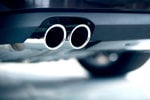DVLA changes to the eyesight requirements for drivers have missed a chance to improve road safety, according to Specsavers Corporate Eyecare.
Despite the opportunity to introduce tougher vision standards, a DVLA consultation has concluded that the current number plate test, which dates from the 1930s, is to remain in place with no change to the distance from which the letters and figures must be read to test visual acuity.
With a minor alteration to the existing standards, the DVLA now simply states that drivers applying for their licence must declare that they have “never been told that their vision is below that of the EU minimum measurement”.
There will be no routine eyesight check and no requirement for a professional opinion when applying for a licence.
Jim Lythgow, director of strategic alliances at Specsavers Corporate Eyecare, explained: “If a driver happens to visit an optician of their own volition and it is found that their eyesight does not meet the EU standard, they must notify the DVLA.”
The authors of the report state: “Since most individuals will undergo eyesight testing at some point when they need it, this is a more proportionate way of reinforcing the effectiveness of the number plate test, than to require mandatory formal testing on every licence renewal.”
Lythgow continued: “Relying on the individual to decide for themselves whether to visit the opticians is wholly inadequate.
“Eyesight often deteriorates slowly over time and subtle changes can go unnoticed. This also relies, of course, on the individual being inclined to go for an eye test and to then notify the DVLA of any problems.”
He added: “We are pleased that the number plate test has now been qualified with a professional equivalent - the EU minimum measurement is 6/12 or Snellen decimal 0.5 - but the changes do not go nearly far enough.
“As providers of corporate eyecare, we have been looking at the changes from the employer’s point of view.
“Many of our customers already provide eyecare to all employees who drive in the course of their work.
“Company-funded eyecare is offered both as an employee benefit and as a part of the employer’s duty of care.
“With the driving vision standards basically unchanged, it’s still vital that employers take control of the situation, by ensuring their employees are fit to drive.”
Lythgow’s concerns are reflected in statistics from road safety charity Brake, which reveal that one in six UK drivers would fail an eyesight test.
Specsavers believes that this figure could be even higher and closer to one in three drivers.
Furthermore, it is those who drive in the course of their work who are most at risk. The Transport Research Laboratory states that company car drivers have 50% more accidents than those driving for domestic purposes.
Lythgow concluded: “Action is needed. Eyesight testing is obligatory for computer users in the workplace and responsible employers are already aware of the many advantages of offering eyecare for drivers too.
“If the DVLA is not prepared to strengthen the standards for vision then we hope that employers will see the many benefits in taking responsibility on their own initiative.”

















Login to comment
Comments
No comments have been made yet.